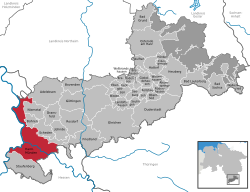Hann. Munden
| Hann. Münden | ||
|---|---|---|

Town hall
|
||
|
||
| Coordinates: 51°25′N 09°39′E / 51.417°N 9.650°ECoordinates: 51°25′N 09°39′E / 51.417°N 9.650°E | ||
| Country | Germany | |
| State | Lower Saxony | |
| District | Göttingen | |
| Government | ||
| • Mayor | Harald Wegener (Bürgerforum Hann. Münden) | |
| Area | ||
| • Total | 121.12 km2 (46.76 sq mi) | |
| Elevation | 123 m (404 ft) | |
| Population (2015-12-31) | ||
| • Total | 24,072 | |
| • Density | 200/km2 (510/sq mi) | |
| Time zone | CET/CEST (UTC+1/+2) | |
| Postal codes | 34346 | |
| Dialling codes | 05541 | |
| Vehicle registration | GÖ, DUD, HMÜ | |
| Website | www.hann.muenden.de | |
Hann. Münden (short for Hannoversch Münden, colloquially called Münden) is the German official name of a town in Lower Saxony, Germany. The city is located in the district of Göttingen at the confluence of the Fulda and Werra rivers, which join to form the river Weser. It has about 24,000 inhabitants (2013). It is famous for its several historical houses, some of them more than 600 years old.
The name of the town was originally Münden. For postal purposes it was often confused with Minden which also lies along the Weser river, and sometimes with Munich (German: München). The official name was changed to Hannoversch Münden (during its 19th-century affiliation with the Kingdom of Hanover) in order to distinguish the city from then Prussian-affiliated Minden (which is similarly pronounced). To avoid confusion with Hannover-Schmünden, Hannover-Münden, Hannover bei Münden and Hannover bei München, the city's name was abbreviated by the Hanoverian Southern Railway to Hann. Münden on passenger tickets following the 8 May 1856 opening of the line, which became its official name in 1991. Inhabitants still generally refer to their own town as Münden.
The place is first mentioned in the deeds of donation of Gimundi to the abbey of Fulda, in 802.
City rights might have been granted during the latter half of the 12th century.
The French inventor Denis Papin built a steam-pump-powered paddlewheel boat, probably pedal-driven in 1704, and as a demonstration used it to navigate down the Fulda River from Kassel to Münden in 1707.
Hann. Münden was the site of the Royal Prussian Academy of Forestry: the city's botanical gardens with many different trees were primarily established for this academy. Later the academy was merged into the University of Göttingen, moving to a new building on the main campus in 1970.
...
Wikipedia



